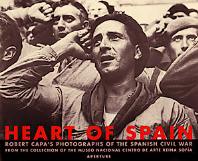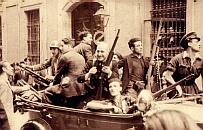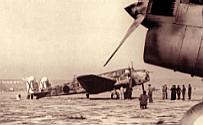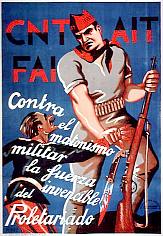 The great romantic cause for progressives in the 20th century was the Spanish Civil War. Beginning in the summer of 1936 and lasting until early 1939, it was in effect the prodromal stage of the full-blown disease that became World War Two.
The great romantic cause for progressives in the 20th century was the Spanish Civil War. Beginning in the summer of 1936 and lasting until early 1939, it was in effect the prodromal stage of the full-blown disease that became World War Two.General Francisco Franco and his military co-conspirators botched the early part of their uprising and failed to take Madrid, thus guaranteeing a protracted and bloody conflict for the control of Spain. Early on in the war, Britain and France effectively prevented a Republican victory, cynically declaring neutrality whilst imposing an embargo against the Spanish Republican government on arms and supplies. General Franco and the Nationalists received ample support from the Fascists in Italy and the Nazis in Germany, and the Republicans were cast into the arms of the Soviet Union for their own support.
 If you were a Leftist, a Communist, an Anarchist, or even just an old-fashioned romantic, Spain was the place to be in 1937. Volunteers flooded in from the rest of Europe and North America, forming the “International Brigades” which fought alongside the forces of the Spanish Republic.
If you were a Leftist, a Communist, an Anarchist, or even just an old-fashioned romantic, Spain was the place to be in 1937. Volunteers flooded in from the rest of Europe and North America, forming the “International Brigades” which fought alongside the forces of the Spanish Republic.The valiant Republicans were celebrated in art and drama, with the photographs of Robert Capa standing as the emblem of the struggle. After the civil war was over, Stalin’s abrupt about-face with the Molotov-Ribbentrop pact took the bloom off the great romantic myth of the Spanish Civil War. Even so, the idea of the “Cause” never completely died.
Al Stewart captures the spirit of the period in this song from his album Between the Wars:
Always the Cause- - - - - - - - - -
by Al Stewart
Bad news over the great divide
Comes in from every side
Still hope won’t be denied
There was always the Cause
There was always the Cause
Oh La Pasionaria sang
This day, ¡No Pasarán!!
It echoed out in Catalan
There was always the Cause
There was always the Cause
Mariposa
Late nights waiting on the via dolorosa
Hold me closer
Not long now, oh ma bella hermosa
There was always the Cause
Setbacks come at every turn
New ways are hard to learn
Tonight I saw Guernica burn
There was always the Cause
There was always the Cause
Mariposa
Late nights waiting on the via dolorosa
Hold me closer
Not long now, oh ma bella hermosa
There was always the Cause
Three years gone in the heart of Spain
He brings home a quiet pain
He’ll never be that young again
There was always the Cause
There was always the Cause
Mariposa is the Spanish word for “butterfly”. Perhaps the young man in the song was using it as a pet name for his beloved, his bella hermosa.
But mariposa is also Spanish slang for a homosexual. During the war, General Franco was sometimes depicted on his opponents’ propaganda posters as an effeminate fop, and dubbed La Mariposa. But a more likely reference would be to a 1919 play by the homosexual playwright Federico García Lorca, El Maleficio de la Mariposa (“The Curse of the Butterfly”).
The fate of García Lorca is emblematic of the cultural clash within Spain that grew into the Civil War. He was refined, effete, and modern, the essence of 20th-century enlightenment. When the war came he was pulled out of hiding and shot by the Nationalists, a martyr to the Cause.
La Pasionaria (the passion flower) was Dolores Ibárruri Gómez, a Communist Party stalwart and the editor of Mundo Obrero, who was prominent both before and during the war. After her side lost, she was driven into exile and became a citizen of the Soviet Union. However, she lived long enough to return to the post-Franco Spanish democracy and win a seat in the Cortes.
The Communists played a prominent role in the war, eventually taking virtual control of the Republican effort. It wasn’t that the war was “hijacked” by the Comintern; the Republican cause was never strong enough on its own to hold out against Franco. The most dedicated, zealous, ruthless, and brutal fighters for the Cause were to be found among the Communists and the Anarchists.
Spanish industry had flourished during the Great War in order to supply steel and other war materiel to the Allies. After the war, the emerging proletariat was radical and restive. As the Great Depression moved in the most stalwart Anarchist and Communist strongholds were in Barcelona and other industrial areas of Catalonia.
The Republicans, on the other hand, were modern mainstream intellectuals centered in Madrid. They were anti-clerical and anti-monarchy, and when Primo de Rivera’s dictatorship ended in 1931, the Spanish Republic that eventually formed dedicated its efforts to reining in the Catholic church and the monarchists. The King left the country, and the Cortes enacted a series of laws restricting the Church and expropriating its property. The Constitution of the Republic actually banned the Jesuits.
The massacres and executions by the Nationalists have been well publicized. But when the war came, Republican troops massacred Catholic clergy with great enthusiasm. In one of history’s little ironies, Moroccan Muslim troops fighting for Franco found these atrocities repugnant, and fought with dedication for the Nationalists.
With the Franco-British embargo keeping arms out, the only countries who could supply either side were those who were indifferent to the niceties of international law. The British and the French were in full appeasement mode towards Hitler, and not at all keen on enforcing the embargo as it pertained to the great dictators.
 As a result the conflict became a proxy war, with the Nazis and the Fascists confronting the Soviets. In particular, the new techniques of aerial war and mass bombardment were tested and perfected over the towns and cities of Spain. The Nationalists received Heinkels from Germany and Fiat B.R. 20s from the Italians; the Soviets supplied I-15s and I-16s to the Republicans. For the three great socialist dictatorships, the Spanish Civil War was the testing ground for their latest firepower.
As a result the conflict became a proxy war, with the Nazis and the Fascists confronting the Soviets. In particular, the new techniques of aerial war and mass bombardment were tested and perfected over the towns and cities of Spain. The Nationalists received Heinkels from Germany and Fiat B.R. 20s from the Italians; the Soviets supplied I-15s and I-16s to the Republicans. For the three great socialist dictatorships, the Spanish Civil War was the testing ground for their latest firepower. In Spain, as in any other country, the Communists did not tolerate any rival factions on the left, despite the fact that the initial Socialist upheavals had emphasized the unity of the Left in the face of the common danger. The poster at left features the Confederación Nacional del Trabajo (CNT) , the Federación Anarquista Ibérica (FAI), and the Asociación Internacional de Trabajadores (AIT) acting as one contra el matonismo militar la fuerza invencible del proletariado, “against the bullying military the invincible force of the proletariat”. There was solidarity among the workers, whether Anarchist, Socialist, or Communist.
In Spain, as in any other country, the Communists did not tolerate any rival factions on the left, despite the fact that the initial Socialist upheavals had emphasized the unity of the Left in the face of the common danger. The poster at left features the Confederación Nacional del Trabajo (CNT) , the Federación Anarquista Ibérica (FAI), and the Asociación Internacional de Trabajadores (AIT) acting as one contra el matonismo militar la fuerza invencible del proletariado, “against the bullying military the invincible force of the proletariat”. There was solidarity among the workers, whether Anarchist, Socialist, or Communist.However, as the war ran its course, the Communists acted ruthlessly to suppress any ideology other than that of orthodox Bolshevism. The Anarchists and the Socialists were zealous warriors on behalf of the Cause, but they were nonetheless purged by the Party — imprisoned and executed for the crime of not being Communists, in a civil war within the Civil War.
Intelligent and observant members of the International Brigades came home disenchanted with Soviet Socialism. George Orwell, in Homage to Catalonia, left the best record of this conversion. His experiences in Spain led him to write Animal Farm and 1984, and he became a staunch anti-communist.
But the dream never died. Among those who still deny the guilt of Alger Hiss and the Rosenbergs, who say, “True Socialism has never really been tried”, who look to Hugo Chávez and Fidel Castro for inspiration — among these true believers, the Spanish Civil War is still the Cause.
Communism has departed, leaving nothing but toxic waste, devastated lives, and cubic miles of mass graves spread across five continents. Yet the hope lives on.
General Franco and the Nationalists prevailed against the Republican socialists, but they couldn’t destroy the Cause.
They worked their will on John Barleycorn, but he lived to tell the tale.

Other resources on the Spanish Civil War:
Wikipedia — The Spanish Civil War
Posters from the Spanish Civil War
Italian aviation in the war
Multiple resources on the war — mostly links to leftist sites, but still worth a look.
The TUC and the Spanish Civil War
Heart of Spain: Robert Capa’s Photographs of the Spanish Civil War

15 comments:
Thank Hemmingway for much of the misguided popularity of the so-called Republican cause, too.
That asinine story "For Whom the Bell Tolls" undeservedly lionized the Stalinist cause. It became a film, starring Gary Cooper, to boot.
What a strange world we live in.
I think the tone of your account of the Spanish Left and who's to blame for the Civil War comes out too neutral.
Watching a Granada TV production about the Spanish Civil War, one gets another impression as to the causes and the blame. Although there were justifiable reasons for discontent among the poor and the working class, and surely no side was without blame, the main burden of guilt lies - as always - with the Left. By that I mean the extremism and the excesses of the Spanish Communists in the Thirties. The TV-series I'm referring to show the violent anti-clericalism of the Left, and that the Left really was bent on revolution and radical change in the vein of the Soviet Union. While I'm certainly not well-read on Chile and the coup there in 1973, I recall reading accounts of Leftist excesses there too. We had a Baltic writer here in Sweden in the Eighties, who wrote a book with the title "Sowing Socialism, Reaping Fascism". That's a title really to contemplate. Maybe one now can change it to "Sowing Multi-Culturalism, Reaping Fascism".
Amazon
New York Times
politisktinkorrekt --
I am not an expert on the Spanish Civil War, so I tried to stick to the facts as I know them.
I'm aware that the Left bears the brunt of the blame for the war, as it does for all the totalitarian brutality from 1920 until 1989.
It continues to aid and abet murderous dictatorships right up to today.
But, unless I am a total expert on a topic, I try to stick to what I know for sure. Otherwise I get flamed by people who know more than I do.
Hence my measured tone in this post.
I would assume "On the Border" was also about the Spanish Civil War?
BTW, May I ask if Al Stewart has ever posted here (that you know of) or has he contacted you since you started posting so much about him?
Zero --
Yes, "On the Border" was at least elliptically about the Spanish Civil War, I think.
Al Stewart hasn't contacted me, nor has he commented here as far as I know. But I hope I sold a few CDs for him!
I have at least one more history-related song of his which I will feature here eventually.
The Republicans were democratic to the extent that they used elections to gain power, but they engaged in many abuses and crimes beyond killing priests and can't be mourned by anyone who values constitutional democracy.
thrasymachus,
Have you heard about the latest bout of anti-Nationalist apoplexy in Spain, including possible reparations for surviving Republicans?
Franco was a fascist, just like Pinochet, and WE JUST KNOW that fascism is evil. Just judge by his actions :
executed communists, suppressed leftists, banned trade unions,
enforced Christian values by law, built up the economy by capitalism. And also some bad things.
Fellow Peacekeeper, Franco was just another Authoritarian Latino bully. Besides that he executed communists (when mere imprisonment would have done it) and suppressed leftists (when he suppressed also the cause of freedom and civil liberties as well), he was single-mindedly Castilian in a multi-national country, eventually driving the country on the verge of breaking apart into Basqueland, Catalonia, Galicia and rump-Castile. His economical politics was a disaster, he also suppressed any other denominations than Catholicism, there was nothing to speak of religious freedom or free speech, and his military dictatorship froze the economical and social development of the country for forty years.
In other words, Franco was a disaster. Nothing short a catastrophe for Spain. It is no defense that his reign prevented even a worse catastrophe. He was something not unlike a Latino version of Slobodan Milosevic.
The Spanish Civil War began as the conflict of Nationalists and Republicans, and ended as war of Fascists and Communists.
In other words, Franco was a disaster. Nothing short a catastrophe for Spain.
Not a catastrophe when compared to the alternative of a Stalin-backed Republican victory.
1938 the Republican victory would have been Stalinist because the good guys (Western democracies) shirked in 1936. The only thing evil needs to victory is nobody taking the stand.
If the good guys had shown some spine in 1936, the Republican victory would have been triumph of democracy instead of the republican side falling on Stalinist side.
Anyone interested in the Spanish Civil War should read Arturo's Barea's memoir "The Forging of a Rebel," which I review here.
Barea was a committed Republican, but was not blind to the atrocities perpertrated by his own side.
David--
Beautiful review. I like the way you divided up his life's chapters...or perhaps he did that and you simply reported on it?
Either way, it's a fascinating tale --just reading your review has stayed with me.
Can anybody spot the irony in a supposedly anti-fascist blog pissing all over people who actually fought against fascism?
Come on, the next post has to be a mealy-mouthed dribble about the millions of Russians who died fighting Hitler. Zing, glad you're dead, commie scumbags!
Really, if you ever had a lucid moment of self-awareness, your brains would explode. This is kryptonite to satire.
Thanks, Uncle Pavian. Here's the song he linked to...very evocative (though the link they provided to an audio snippet is out of date.
Where in God's green world did you *get* that link, Uncle P? It's from 1997, I think.
Anyway, the song:
CATALONIA
(Phil and June Colclough)
1. There's blue skies across the bay
sunshine on December days
and white horses over the waves
that fall on Catalonia.
The northern winter's dull and grey
and peace so easily slips away
and many's the young one sailed away
to fight in Catalonia.
2. Barcelona's dressed in banners bright
and ballad singers in the night
with voices high that tell of a fight
that breaks in Catalonia.
The world's eyes turn on Spain
where everyone's (a child??) again
and right and wrong it seems so plain
on roads to Catalonia
3. On mountain slopes in pallid sun
ragged soldiers sing a song
the boy so soon becomes a man
on hills in Catalonia
And frost turns the trenches white
and sentries shiver in the night
and snipers kill in the early light
from peaks in Catalonia
4. In sleepless nights and endless days
when dice are thrown and cards are played
the young one learns the soldier's ways
on hills in Catalonia
But there the soldier finds no fame
and many will never see home again
the lucky ones they catch the train
for leaving Catalonia
5. In railway cars the soldiers dream
of featherbeds and Spanish wine
and girls are waiting by the line
for trains in Catalonia
In Barcelona no one speaks
and tired soldiers find no peace
and spies up the empty streets
of towns in Catalonia
6. In rivers, valleys, and mountain sides
soldiers now are forced to hide.
The fate of Spain the world decides
and that of Catalonia
The sun sinks in the Spanish sky
and darkness comes to hide the lie
the (young one?) now must run or die
on the fields of Catalonia
7. But flowers bloom in the Spanish spring
and small birds they find their wing
and hope sings of further wins
to those of Catalonia
On all the fields new seed is grown
and not in vain the good die young
for those of heart the song is sung
for the child of Catalonia
____
Makes you wonder if Al Stewart was aware of this song? He doesn't borrow from it, but the mood is the same.
Nice one anti-fascists, way to refute me.
My next-door neighbour took a bullet through the knee fighting in the Falaise Pocket for the Canadians, but compared to you guys and your coalition to save Western Civ, his sacrifice smacks of cowardice.
No doubt the anti-Franco forces were a similar gang of pussies, pussies who lacked the courage you display in saying loud and clear, "We oppose Islamism!".
Well done, how I wish I had your bravery.
Post a Comment